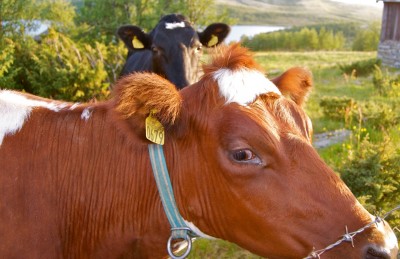UPDATED: Norway’s large and powerful dairy cooperative Tine, bashed for failing to produce enough butter last year, now risks angering Norwegian consumers and its own farmer-members once again. It recently made an attempt to further block cheese imports, to protect its own products and high prices, and now comes news that Tine’s board chairman is paid much more than the chairman of oil company Statoil.

Norwegian Broadcasting (NRK) reported on Friday that the chairman of Tine is being paid NOK 917,000 (USD 182,000) per year. That’s NOK 260,000 more than the amount paid to the chairman of Statoil, Norway’s largest stock-listed company. Tine’s board members meet, according to the company, approximately once a month.
Dairy farmers who sell their milk to Tine are criticizing the board members’ compensation (called styrehonorar), which amounts to much more than the annual salaries paid most full-time Norwegian workers. The high compensation is also setting off negative political reaction.
“I think it’s about time that the farmers have a showdown with their own nobility (the board and management of their cooperative, Tine),” Torgeir Trældal, spokesman for the Progress Party (Fremskrittspartiet, Frp) on agricultural issues, told NRK.
“They (Tine officials) complain that their income from milk is too low,” Trældel continued, “but then they use up their money on high compensation for board members and management, much higher than what we normally see in Norway.”
Even Per Olaf Lundteigen, the veteran member of the farmer-backed Center Party that long has protected Tine, was upset by news of Tine’s chairman’s high compensation. “This sets a bad example,” Lundteigen, a farmer himself, told NRK.
Svenn Arne Lie, a political scientist and former agricultural researcher, said compensation paid out to board members should be evaluated on the basis of what they’ve achieved for their owners, especially in a cooperative. “And there are many examples that Tine has not looked out for the interests of dairy farmers in an especially good manner,” Lie told NRK.
Many dairy farmers were angry with Tine for failing to urge more milk production in time to head off the butter shortage. Others are unhappy with moves by Tine and its members to squeeze the few and much smaller rivals like Q-Dairy and Synnøve Finden. The head of one farmers’ group, Norsk Bonde- og Småbrukarlag, said on national radio Friday that the high pay for its directors gives Tine “a bad reputation” and the levels of compensation must be reduced immediately.

Now there are indications of a public shift in sentiment away from Tine, among those who feel the dairy giant is more concerned with market power than consumer needs. Earlier this month, with Norwegian butter back on most store shelves, Tine’s chief executive Stein Øiom stirred controversy anew when he said Tine would now seek to block imports of fine cheeses from abroad by asking state authorities to change their method of calculating tariffs. The result would likely price imported cheese, including French brie and Camembert, out of the market, forcing Norwegian consumers to buy Norwegian cheese and, effectively, boost Tine’s bottom line.
“We want the barrier for imported cheese to be higher,” Øiom candidly told newspaper Aftenposten. “We need that, to protect the Norwegian products.” He worried that rising imports threaten Tine’s products, and also the Norwegian dairy farmers.
His proposal met immediate opposition, not least on newspapers’ editorial pages, where Tine was accused of promoting punitive price levels on imports instead of improving its own products to make them more attractive to customers. Tine was also accused of not recognizing that Norwegian consumers are unhappy with poor selection in grocery stores, when compared to selection in other countries, and the fact that food prices are much higher in Norway than in most all other countries.
The outcry seemed to make Øiom retreat, with Tine later stating that it wouldn’t seek higher import tariffs on popular French cheeses. It would, however, still seek import restrictions on the type of cheese that rivals its Jarlsberg and Norvegia brands.
Despite Øiom’s concerns that Tine’s revenues are threatened, it reported strong profits for 2011, even after the butter shortage. Sales of Jarlsberg cheese alone, which costs much less in the US and UK than it does in Norway, rose 14.5 percent and Norvegia sales were up 10.3 percent. Milk sales, though, declined, as Norwegians increasingly opt for other beverages with their meals.
Tine CEO Øiom, meanwhile, defended the high compensation paid to what the Progress Party politician called Norway’s dairy “nobility.” Øiom said Tine was “a large company, with NOK 20 billion in annual revenues,” contending that Tine board members have a “big job” and lots of responsibility.
He claimed the board fees were also meant to compensate farmers who had to be away from their farms to attend Tine meetings. “The cows need to be milked every day,” he told NRK. “So you must be able to pay for back-up help when you have to attend a board meeting.”
Views and News from Norway/Nina Berglund
Please support our stories by clicking on the “Donate” button now:

